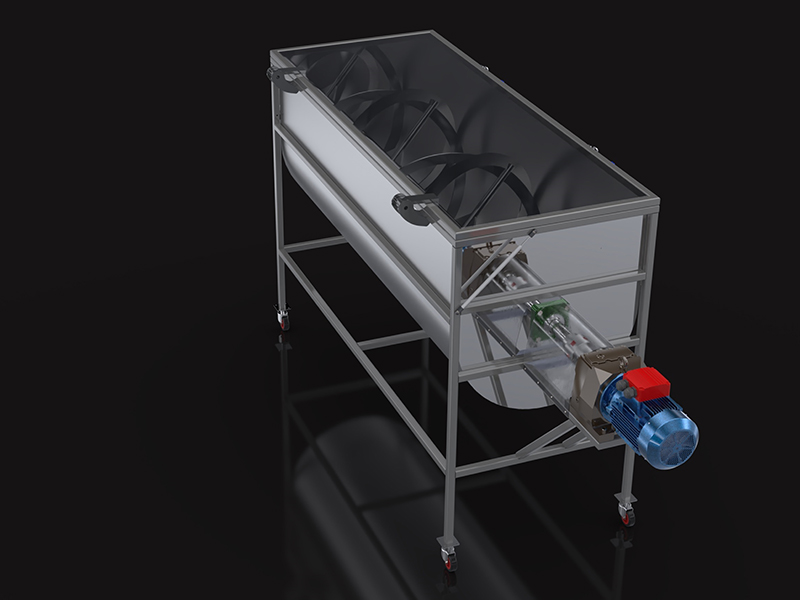Homogeneous mixing of powdered materials is the foundation of many industrial production processes. In many sectors, from food production to pharmaceuticals, from chemicals to cosmetics, the mixing process directly impacts quality, product safety, and efficiency. At this stage, stainless steel powder mixer systems come into play.
What is a Stainless Powder Mixer?
Definition and Basic Function
A stainless steel powder mixer is an industrial machine used to homogeneously mix different types of powders or granular materials. Optimized for speed, pressure, and movement, these devices ensure precise, fast, and high-quality mixes.
Why is Stainless Steel Preferred?
Stainless steel, with its high corrosion resistance, longevity, and hygienic properties, is the most reliable material for these applications. The use of stainless steel is a necessity in the food and pharmaceutical industries.
Areas of Use
In the Food Industry
It’s preferred for mixing dry food items like flour, spices, milk powder, and sugar. Due to hygiene standards, using stainless steel offers a significant advantage here.
In the Chemical Industry
Chemical powders must be mixed in precise proportions. Details such as anti-static properties and sealing are crucial.
In Pharmaceutical and Cosmetics Production
Pharmaceutical and cosmetic raw materials in powder form must be mixed thoroughly and homogeneously before production. Stainless steel is essential for maintaining sterile conditions.
Construction and Powder Coating Industry
High capacity mixers are required for industrial mixtures such as powder paint and cement additives.
Technical Specifications
Engine Power and Energy Efficiency
Stainless steel powder mixers typically have motors between 3 kW and 30 kW. Energy-efficient inverter motors are preferred.
Mixing Volume and Capacity Options
It can be produced in different volumes, from 50 liters to 5000 liters. Special dimensions are available upon request.
Blade and Pallet Designs
Spiral, anchor or Z type pallet systems can be used to increase mixing efficiency.
Mixing Technologies and Types
Horizontal Mixers
It is suitable for granular and coarse powders. It is easy to clean.
Vertical Mixers
Ideal for narrow spaces. Provides rapid mixing at high speed.
Spiral Mixers
Suitable for sensitive mixtures. Homogenizes powders without damaging their structural properties.
Stainless Steel Types
Difference Between 304 and 316 Quality
Grade 304 stainless steel is suitable for food applications, while grade 316 is preferred for more aggressive chemicals.
Corrosion Resistance and Hygiene Standards
Both grades are resistant to corrosion, but grade 316 is more resistant to harsh environments such as seawater.
Hygiene and Cleaning Advantages
Stainless surfaces prevent bacteria from adhering. They are easy to clean and compatible with CIP systems. This saves time on the production line.
Why Should Professional Systems Be Used in Powder Mixing?
Hand-mixing or simple mixers can disrupt homogeneity. This can lead to fluctuations in product quality, waste, and customer complaints. These risks are minimized with professional systems.
Advantages of Stainless Powder Mixers
Durability and Longevity
High-quality stainless steel material can work for years without maintenance.
Ease of Cleaning
Thanks to its smooth interior surfaces, it can be easily cleaned in just a few minutes.
Precise and Homogeneous Mixing
All ingredients are mixed equally. Product quality and consistency are standardized.
Privatization Opportunities
Depending on your business needs:
Heating/Cooling jacketed systems
PLC controlled automation
Vacuum or pressure mixing
Options such as mobile wheeled body can be offered.
Things to Consider When Choosing
Material type (food, chemical, etc.)
Daily production capacity
Ease of cleaning
Spare parts and technical service support
CE and ISO documents
Common Mistakes and Things to Avoid
Inappropriate volume machine selection
Use of low-quality steel
Insufficient mixing time
Manual cleaning challenges
Reliable Mixer Solutions with Asinoks
Asinoks, a company specializing in stainless steel equipment manufacturing, offers specialized powder mixer solutions for a wide range of industries, including food, chemicals, and pharmaceuticals. We are always here for you with high-quality production, fast delivery, and technical support.
Conclusion: The Path to Productivity
Stainless steel powder mixerA mixing plant is a critical piece of equipment that directly impacts quality, efficiency, and hygiene in production. With a properly designed system, you can save time, labor, and costs, while also increasing customer satisfaction. Remember, a product that doesn’t mix well won’t sell well.
FAQ – Frequently Asked Questions
1. What determines the price of stainless steel powder mixers?
The price varies depending on the volume of the machine, engine power, material quality and optional equipment.
2. In which sectors is it suitable for use?
It is widely used in the food, chemical, pharmaceutical, cosmetics, powder coating and construction industries.
3. How to clean the mixer?
Automatic cleaning can be achieved with CIP systems. Additionally, designs with wide lids should be preferred for manual cleaning.
4. How many years does stainless steel last?
When used correctly, it can last more than 10 years.
5. How long is the warranty period for Asinoks products?
All Asinoks products come with a 2-year warranty. Technical service and spare parts support are available.
Paslanmaz toz karıştırıcılar, düzenli bakım ve temizlikle birlikte uzun yıllar boyunca sorunsuz bir şekilde kullanılabilir.
Gıda, kimya, ilaç ve kozmetik endüstrileri gibi çeşitli sektörlerde yaygın olarak kullanılır.
Paslanmaz çelik en yaygın malzeme olmakla birlikte, bazı karıştırıcılarda alüminyum ve plastik gibi malzemeler de kullanılabilir.
Karıştırma süresi, kullanılan malzemelere ve karıştırıcının kapasitesine bağlı olarak değişir. Genellikle birkaç dakikadan birkaç saate kadar sürebilir.
Paslanmaz toz karıştırıcıların bakımı, düzenli temizlik ve periyodik teknik kontrollerle yapılmalıdır. Üretici talimatlarına uygun şekilde bakım yapılması, cihazın ömrünü uzatır.


